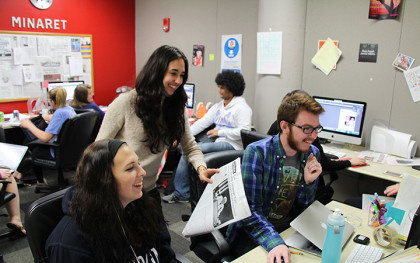I love the academy. I love having smart conversations with my colleagues and students. I love seeing young people’s eyes opened to new ideas and a critical perspective on all manner of topics and issues. I love seeing older students who return to school and find a new or refreshed love of learning. I am a vocal proponent of the enduring value of higher education for all who choose to pursue it.
But I am also a strong advocate, particularly for traditional students, our emerging adults, that they need to spend time outside the ivory tower to gain skills and wisdom they can’t get in the classroom. For many young people, this comes in the form of the internship.
As the internship coordinator for our journalism program, I get to witness regularly the maturity and professional development that students gain through good internships. (And, of course, not all internships are created equal.) When students have a boss, not just a professor, to report to, something changes.
Through internships, students who previously thought I—or their other journalism professors—were unreasonable for insisting on firm deadlines soon realize that their editors in the newsroom have even less tolerance for late stories. Our young journalists who in the classroom saw their stories as having an audience of one—the teacher—awaken to the fact that their work can have a much broader impact on a much wider range of readers, viewers or listeners. For better or worse.
There is just something about the applied, experiential learning in a “real-life” job setting that you can’t get in the classroom. I can lecture until I’m blue in the face, telling students, “When you get out there on the job ’” But until they’re there, until they experience it for themselves, it doesn’t click.
Good internships do more than just teach rookies the hard facts of work in the real world. They also give them the validation of genuine professional accomplishment. I love sharing in my students’ excitement when they send me their latest clip that gets published. One of the great rewards of being a professor is that you get to brag on your students when they succeed.
And I love it when these young people surprise the seasoned pros, too. Recently, there’s been a lot of mention in the journalism world about Ting Shen, a 27-year-old intern at The Dallas Morning News who took the powerful photo of a black male police officer consoling a white (plain-clothes) female officer at the hospital in the immediate aftermath of the sniper attacks in Dallas earlier this month. The photo went viral and ran in newspapers and on websites across the United States.
It’s good for the old guard to see the contributions and potential of the new guard coming up. And it’s good for the greenhorns to learn from the veterans.
So it makes me think: What about me? What about in the church? Is there someone who needs a spiritual mentor? Is there someone who needs some words of encouragement or caution from those of us who have been on this walk for a while?
To be honest, I often feel so ill equipped. I see my faults and failures, and I think, “Who am I to mentor anyone?”
I’m me. Maybe there is some young Christian out there who could learn as much from my weaknesses as they could from my strengths. Maybe they can relate to my challenges and be inspired by my accomplishments.
You see, my journalism students don’t need a Pulitzer Prize winner to show them the ropes. They just need someone who has been grinding it out for longer than they have, who maybe has had a few big stories and a lot of smaller ones. They need someone to tell them how embarrassing it is to get a fact wrong, and how great it feels when you get it right. They need someone who can give them some advice on how to get a source to talk or how to use public records. Thankfully, there are good journalists like this all over the world.
And there are genuine Christians in churches everywhere that have more to offer their younger brothers and sisters than they realize. If this is you, pray about who God would have you to mentor. If you’re a young Christian, pray and seek out someone more seasoned in the faith who can invest in your life, share some wisdom, and help you avoid the common pitfalls of this journey.
We don’t just need to share our faith with nonbelievers; we need to share it with one another, too. Sunday morning services make for great classroom learning, but it’s the on-the-job training every other day of the week where you discover how the real work gets done.
Photo credit: David Wheeler
Jeff Neely is an assistant professor of journalism at The University of Tampa, where he teaches courses in newswriting, feature writing, multimedia journalism and literary journalism. His research has examined the role narrative and literary journalism can play in broadening our understanding of various issues and experiences life brings our way, from identity formation to environmental ethics. He has also studied how youth journalism programs, where young people tell their own stories and those of their peers, can help strengthen local communities. He is currently working with local non-profit outreach organizations to build a youth journalism program called Tampa Youth Voice. Prior to entering academe, Jeff worked as a writer and editor for various publications in and around the Tampa Bay area, as well as a case manager and resource development specialist for the Florida foster care system.


Leave a Reply